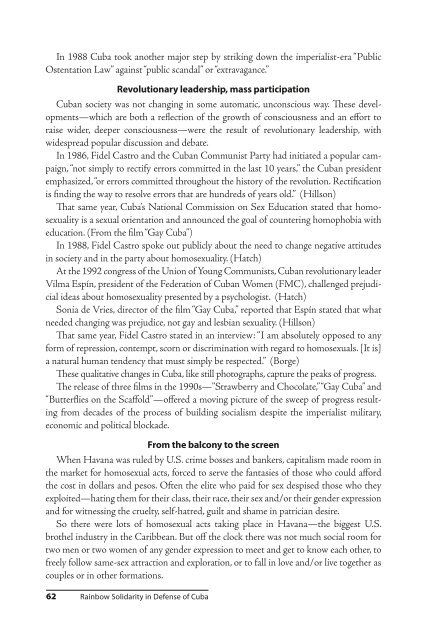LavenderRed_Cubabook
LavenderRed_Cubabook
LavenderRed_Cubabook
You also want an ePaper? Increase the reach of your titles
YUMPU automatically turns print PDFs into web optimized ePapers that Google loves.
In 1988 Cuba took another major step by striking down the imperialist-era “Public<br />
Ostentation Law” against “public scandal” or “extravagance.”<br />
Revolutionary leadership, mass participation<br />
Cuban society was not changing in some automatic, unconscious way. These developments—which<br />
are both a reflection of the growth of consciousness and an effort to<br />
raise wider, deeper consciousness—were the result of revolutionary leadership, with<br />
widespread popular discussion and debate.<br />
In 1986, Fidel Castro and the Cuban Communist Party had initiated a popular campaign,<br />
“not simply to rectify errors committed in the last 10 years,” the Cuban president<br />
emphasized, “or errors committed throughout the history of the revolution. Rectification<br />
is finding the way to resolve errors that are hundreds of years old.” (Hillson)<br />
That same year, Cuba’s National Commission on Sex Education stated that homosexuality<br />
is a sexual orientation and announced the goal of countering homophobia with<br />
education. (From the film “Gay Cuba”)<br />
In 1988, Fidel Castro spoke out publicly about the need to change negative attitudes<br />
in society and in the party about homosexuality. (Hatch)<br />
At the 1992 congress of the Union of Young Communists, Cuban revolutionary leader<br />
Vilma Espín, president of the Federation of Cuban Women (FMC), challenged prejudicial<br />
ideas about homosexuality presented by a psychologist. (Hatch)<br />
Sonia de Vries, director of the film “Gay Cuba,” reported that Espín stated that what<br />
needed changing was prejudice, not gay and lesbian sexuality. (Hillson)<br />
That same year, Fidel Castro stated in an interview: “I am absolutely opposed to any<br />
form of repression, contempt, scorn or discrimination with regard to homosexuals. [It is]<br />
a natural human tendency that must simply be respected.” (Borge)<br />
These qualitative changes in Cuba, like still photographs, capture the peaks of progress.<br />
The release of three films in the 1990s—”Strawberry and Chocolate,” “Gay Cuba” and<br />
“Butterflies on the Scaffold”—offered a moving picture of the sweep of progress resulting<br />
from decades of the process of building socialism despite the imperialist military,<br />
economic and political blockade.<br />
From the balcony to the screen<br />
When Havana was ruled by U.S. crime bosses and bankers, capitalism made room in<br />
the market for homosexual acts, forced to serve the fantasies of those who could afford<br />
the cost in dollars and pesos. Often the elite who paid for sex despised those who they<br />
exploited—hating them for their class, their race, their sex and/or their gender expression<br />
and for witnessing the cruelty, self-hatred, guilt and shame in patrician desire.<br />
So there were lots of homosexual acts taking place in Havana—the biggest U.S.<br />
brothel industry in the Caribbean. But off the clock there was not much social room for<br />
two men or two women of any gender expression to meet and get to know each other, to<br />
freely follow same-sex attraction and exploration, or to fall in love and/or live together as<br />
couples or in other formations.<br />
62 Rainbow Solidarity in Defense of Cuba


